#sterilization
Text

[I.D.: screencap of a tweet from user NailsNCrowns that reads, "someone put together a Google doc of 150 gynecologist that will tie your tubes without asking if you have kids, your marital status and no matter your age. Its sorted into alphabetical order by state." (they include the link to the doc here. Doc linked at end of this post). The same user comments on their post, "if your city isn't on the list, please check back in a few hours because this list is updated hourly. (3 heart emojis) /End I.D.]
A friend of mine sent me this screen shot and a link to the Google doc. I've seen lots of posts about how to avoid pregnancy in light of roe v wade being overturned but nothing about this Google doc yet so I figured I'd make one. I know not everyone is in a position where surgery is an option, but for those who do want and can get their tubes tied, it's often difficult for them to get doctors to agree to it if they're young and unmarried or married without kids because they "might change their mind," which is misogynistic and condescending enough to deserve its own post but I digress. This is a crowd sourced list, the email to submit a doctor if you know one or are one is listed at top of the doc. Stay safe, friends.
#roe v wade#abortion rights#pregnancy prevention#tubal ligation#crowd sourcing#us politics#reproductive rights#r v w#sterilization#ask to tag#women's rights#current events
9K notes
·
View notes
Photo

Map of forced sterilization within the US
Disabled people have fought to make their own decisions about their bodies. But many laws still take that decision away. These include laws about sterilization.
Sterilization is an operation that stops someone from ever having babies. In many states, laws say that doctors can sterilize disabled people against their will. This is called forced sterilization.
Most states allow forced sterilization today. Laws allowing forced sterilization exist in 31 states plus Washington, D.C.
We wrote this report in Plain Language. Plain Language is a style that is more accessible to many people. We wrote this report with help from the Autistic Women and Nonbinary Network.
See the full report here.
See the summary version here.
See the Forced Sterilization Laws in Each State and Territory (Appendix) here.
8K notes
·
View notes
Text
Controversial opinion: I think if you want to sterilize yourself, you should be able to without any requirements. No one should have to have kids, be married, or be above a certain age. True autonomy is impossible to acheive without realizing this.
697 notes
·
View notes
Text
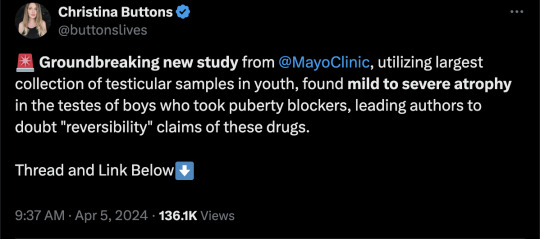
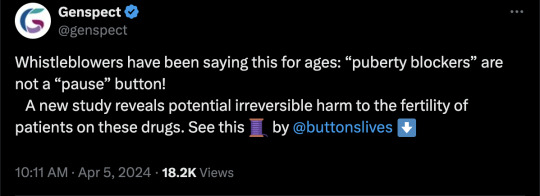
By: Christina Buttons
Published: Apr 4, 2024

[ Figure 2: Representative images of Hematoxylin and Eosin-stained sections of testicular tissue biopsied from the testis from GD patients (A) with and (B) without PB exposure. ]
In a groundbreaking study from the Mayo Clinic, a globally recognized leader in medical research and patient care, researchers examined the effects of puberty blockers on testicular development in gender dysphoric male children. Their investigation revealed evidence of mild to severe atrophy in the sex glands of these children, leading the authors to express doubt in the claims of “reversibility” often made about puberty blockers.
The authors assert, “We provide unprecedented histological evidence revealing detrimental pediatric testicular sex gland responses to [puberty blockers].”
This preprint study, not yet peer-reviewed, presents evidence that puberty blockers induce significant cellular changes, impacting testicular development and sperm production in ways that are not fully reversible, with potentially permanent effects on testicular function and fertility. It challenges the longstanding view of puberty blockers as a reversible "pause button" on puberty.
As noted by the researchers of this study, no long-term studies exist for the use of puberty blockers in the context of stopping puberty for gender dysphoric children, and many potential health consequences remain unknown. In particular, the long-term impact on reproductive health is uncertain, making this study critical for filling this knowledge gap.
To address these unknowns, the Mayo Clinic has established the largest collection of testicular samples for patients aged 0-17 years, including those with gender dysphoria who have and have not yet received puberty blocker treatment, creating a database of over 130,000 individual cells for analysis.
Using a novel approach, the research team meticulously analyzed testicular tissue samples from youths undergoing puberty blocker treatment, with those not on puberty blocker treatment serving as controls. This comparison provides important insights into the potential cellular and molecular changes induced by these drugs.
Key Findings
The study utilized the Mayo Clinic's Pediatric Testicular Biobank for Fertility Preservation, which has been recruiting patients primarily from pediatric urology departments since 2015. Researchers analyzed testicular specimens from 87 young individuals (ages 0-17) undergoing fertility preservation surgery for various health reasons. Among these, 16 were gender dysphoric boys between the ages of 10 and 16, all of whom began identifying as transgender girls between the ages of 2 and 15. At the time of surgery, 9 patients (56%) were already on puberty blockers, with exposure ranging from 3 to 52 months. The authors noted that 100% of the 16 children would eventually go on to take them, highlighting “the widespread nature of PB intervention in this demographic.”
Among nine patients treated with puberty blockers, two exhibited unusual features in their testicles upon physical examination. One patient had abnormalities in both testicles, including incomplete development of the tunica albuginea, which is a protective covering around the testicles. The other patient had a right testicle that was difficult to detect.
In one part of the tissue-level analysis, over 400 testicular biopsy samples were analyzed and stained to examine the differences between those treated with puberty blockers and those who were not. Comparisons showed that testicular development in those treated with puberty blockers was abnormal compared to non-treated individuals. There was variability in how individuals responded to puberty blockers, leading to different outcomes in testicular development, including the degeneration of testicular tissues.
The study authors presented a case of a 12-year-old patient who underwent treatment with puberty blockers for 14 months. In this individual, 59% of the sex glands showed complete atrophy, along with the presence of microlithiasis—a condition where small clusters of calcium form in the testicles. This insight suggests that puberty blockers could lead to lasting structural changes. Additionally, research has shown a link between testicular microlithiasis and testicular cancer.

[ D) Representative images of normal (top) and fully atrophied sex gland (bottom). ]
This study also utilized single-cell analysis to investigate the effects of puberty blockers and aging on testicular cell composition. It took a very detailed look at individual cells from the testicles of a 14-year-old who had been on puberty blockers for over 4 years. The study analyzed a total of 130,100 cells, including 11,199 cells from the juvenile puberty blocker-treated patient.
The study observed that over 90% of the cells responsible for sperm production in this patient were stunted at an early developmental stage, unable to progress further. Additionally, it found "pathologically" higher and lower levels of two types of support cells (Sertoli cells) necessary for healthy sperm development. These findings suggest that puberty blockers can disrupt the normal maturation process of cells critical for sperm production.
In another part of the analysis, the authors found distinct cell-specific changes, including altered expression patterns of puberty-associated genes in endothelial cells, due to puberty blocker treatment. The authors believe that these drugs might induce juvenile testicular atrophy in part by disrupting the normal function of testicular endothelial cells.
Another aspect of the study focused on examining the effects of puberty blockers on the genetic activity of early-stage sperm cells, revealing significant changes that could potentially influence their development and fertility. By analyzing the activity of specific genes within these cells, the researchers found that puberty blockers may have caused alterations in gene expression, affecting processes crucial for the normal growth and function of these cells. This analysis suggests that the use of puberty blockers in gender dysphoric youth could have lasting implications for their reproductive health, particularly by impacting the ability of these early-stage sperm cells to mature properly.
Study Impact
Puberty blockers are increasingly used as a treatment for gender dysphoric youth to halt the development of secondary sex characteristics, such as breast development and widening of hips in females, or the growth of facial hair and deepening of the voice in males. Thousands of children in the United States are placed on this medical pathway as part of the gender-affirming model of care, under the presumption that these drugs are safe and fully reversible.
However, many aspects of the long-term consequences of puberty blockers, which have been administered to children off-label in an experimental manner, remain unknown. This study contributes valuable insights into the potential irreversible harm these treatments can cause to bodily and reproductive functions.
Arguably, the most critical finding is the evidence of mild to severe sex gland atrophy in children treated with puberty blockers. This atrophy signifies potential damage or impairment to the structures essential for sperm production, raising serious concerns about the long-term fertility impacts of these drugs for these individuals.
Given the Mayo Clinic's esteemed reputation in the medical and research communities, should the study pass peer review without any issues, its findings will carry significant weight.
Broader Implications
Puberty blockers belong to a group of synthetic gonadotropin-releasing hormone (GnRH) analogues. These drugs act on the pituitary gland to hinder the release of chemical signals that typically trigger the production of estrogen and testosterone. Historically GnRH analogues were used to treat conditions such as prostate cancer, fibroids, and endometriosis and, in some cases, as a measure to chemically castrate sex offenders.
In children, puberty blockers prevent the natural changes of puberty driven by sex hormones and have been used to treat central precocious puberty, a condition where a child begins to sexually mature much earlier than usual. In gender dysphoria, puberty blockers are administered experimentally, lacking long-term testing.
Notably, the U.S. Food and Drug Administration (FDA) has not approved puberty blockers and sex hormones for use in pediatric gender care. No clinical trials have substantiated the safety of these drugs for such non-approved applications and manufacturers of puberty blockers have repeatedly declined to conduct safety trials for their use on this cohort.
While puberty-blocking drugs are often promoted as “safe,” "reversible" and a "pause button" on puberty, these characterizations seem to stem from their approved use for treating central precocious puberty in younger children, not their burgeoning off-label use for managing gender dysphoria in adolescents.
Past studies have indicated possible negative effects on bone density and brain health. There is also a concern that these drugs might solidify gender dysphoria in adolescents, potentially leading them down a lifelong road of biomedical interventions. Following reports in 2016 of suicidal ideation in children administered puberty blockers, the FDA instructed drug manufacturers to include a warning about potential psychiatric issues on the drugs' labels.
Puberty blockers are increasingly administered to adolescents at Tanner Stage 2, the first signs of puberty. Research shows administering puberty blockers at this stage, followed by cross-sex hormones, may result in infertility, sterility, and sexual dysfunction. Furthermore, they inhibit the development of mature male genitalia, making it difficult to create a pseudovagina in the event of a later vaginoplasty due to a lack of sufficient tissue.
The National Health Service England recently announced it would no longer prescribe puberty blockers to youth outside of research settings and closed down its only national clinical service for pediatric gender medicine, following a review that deemed the service "not safe.”
Several European countries, including Sweden, Finland, the UK, Denmark, and Norway have updated their guidelines for youth transition to align with systematic evidence reviews, the gold standard in evidence-based medicine. These reviews concluded that the risks associated with youth transition outweigh any purported benefits. Consequently, these countries have implemented restrictions on medical interventions, prioritizing psychotherapy as a first-line response for minors experiencing gender-related distress.
==
They're sterilizing boys and giving them cancer. When "god" does it, we call him evil. When humans do it, we call it "gender affirming care."
#Christina Buttons#puberty blockers#atrophy#medical scandal#medical malpractice#medical corruption#sterilization#fertility#irreversible#gender affirming care#gender affirming healthcare#gender affirmation#queer theory#gender ideology#gender identity ideology#intersectional feminism#religion is a mental illness
183 notes
·
View notes
Text
A Senate committee studying a bill to establish a criminal offence with respect to sterilization procedures heard emotional testimony from a survivor of coerced sterilization on Thursday.
"It's like you wiped out a generation," Nicole Rabbit, a member of Survivors Circle for Reproductive Justice, an organization for Indigenous women who are survivors of coerced and forced sterilization, told the committee in Ottawa.
Bill S-250 an Act to Amend the Criminal Code (sterilization procedures) would make forced and coerced sterilization punishable under the Criminal Code by up to 14 years in prison.
Full article
Tagging: @politicsofcanada
#cdnpoli#canada#canadian politics#canadian news#canadian#bill s-250#forced sterilization#coerced sterilization#sterilization#Indigenous#genocide#reproductive rights#reproductive health#reproductive justice#bodily autonomy#senate
210 notes
·
View notes
Text
The Affordable Care Act covers sterilization at no-cost if you're in the US.
Article text under cut.
Sitting in the living room of her Cleveland home, 30-year-old Grace O’Malley reflects on when she ruled out having kids of her own.
O’Malley has Ehlers-Danlos syndrome, a genetic condition that weakens the body’s connective tissue, and can get much worse postpartum. About three years earlier, when she was in her mid-twenties, her condition worsened. O’Malley’s doctors told her that if she did get pregnant, her uterus could rupture and her child would be more likely to be born prematurely.
O’Malley was on hormonal birth control up until last May. But after the U.S. Supreme Court overturned Roe v. Wade, she knew an abortion ban was likely coming in Ohio and she might not be able to end a pregnancy if her birth control failed. She booked an appointment with her gynecologist.
“I went in that day and I knew right away I wanted a more permanent solution,” said O’Malley. “I was like, ‘I actually want to talk about getting surgery.’ And the nurse was surprised, and she was like, ‘Oh, okay.’”
Dr. Clodagh Mullen, an obstetrician-gynecologist at MetroHealth Medical Center in Cleveland, said since the Dobbs v. Jackson decision — which took away the constitutional right to abortion and returned the issue to state governments — many of her patients have been increasingly worried about access to reproductive healthcare and seeking more permanent solutions.
“Some patients will say, ‘Oh, could you stash some IUDs for me?’” Mullen said. “They get very nervous that [birth control] is just going to go away overall. Nobody can re-implant your tube once it's been taken out, so I think that they have that comfort of there's no way anybody can take this part away from me.”
Legislators in some Midwest states have floated bans on birth control, which, so far, haven’t gone anywhere. Mullen doesn’t anticipate that access to contraception will disappear.
“But I get why people have that fear, as I also probably didn't really think that Roe was going to get overturned, if you had asked me this four or five years ago,” she said.
What Mullen is seeing in Cleveland is mirrored across the country. The Kaiser Family Foundation surveyed more than 500 gynecologists across the U.S. in the spring and about half of doctors in states with abortion restrictions reported the number of patients seeking sterilization has increased since Dobbs.
That includes states like Indiana and Missouri - where abortion is banned with very limited exceptions, and states like Ohio, Iowa and Wisconsin where bans are currently being disputed, or where residents feel they may lose the right to an abortion. Ohio voters just approved an amendment to the state constitution, which guarantees access to abortion.
Three Ohio health systems that track contraception — MetroHealth Medical Center in Cleveland, University Hospitals in Cleveland, and Ohio State University Wexner Medical Center in Columbus — reported a sharp rise in the number of patients seeking tubal sterilization.
Contraception decisions
There aren’t many big health risks to the type of sterilization procedure Mullen performs. Doctors mostly worry about regret. Most studies found that when doctors followed up, a small percentage of women wished they hadn’t gone through with the procedure.
The majority are like O’Malley, who had some complications post surgery, but said she never second guessed her decision.
“I've never really thought about it, honestly,” said O’Malley. “It’s become kind of a fact of my daily life. It’s like, ‘Hi, I'm Grace. I have red hair and I can't have kids.’”
O’Malley is happy her doctor respected her choice. She believes the political climate helped.
She shared the story of her best friend who sought sterilization in her late 20s, about five years ago. She said her friend had to meet with several doctors before one agreed to do the procedure, and even then, made her wait another year in case she changed her mind.
“My friend did not have that kind of grace,” O’Malley said. “Her doctor probably thought, ‘You would have other options. If you got pregnant and decided that it's really not what [you] wanted, then you could get an abortion.’ Whereas for me, that might not be the option.”
Men decide, too
Men’s contraception patterns are also changing, according to physician reports.
Dr. Sarah Sweigert, a urologist at Ohio State University Wexner Medical Center, said doctors at her office performed double the number vasectomy consults and procedures as they had before the ruling.
She points to a Cleveland Clinic study, which showed that, in the summer following the court decision, the average age of men getting the procedure has dropped from late 30s to mid-30s compared to the same period the year before. The study also showed there was a significant increase in the number of men under 30 and men without children seeking vasectomy consultations post Dobbs. Sweigert has seen that trend first-hand in her practice.
“I think as more women speak out about perhaps not wanting to be on various forms of birth control for decades, I think that men are more aware of vasectomies and perhaps are doing their part,” she said.
Vasectomies are generally safer than female sterilization and have a much quicker recovery.
But Mullen isn’t surprised that so many women want the procedure themselves – they are the ones who would have to carry the pregnancy and handle the ensuing health impacts.
O’Malley feels that acutely. She had been in vulnerable situations in the past. She was sexually assaulted in college and went through a period where she was homeless. O’Malley said her choice was an act of self-protection.
“It’s not like I sit around thinking that the worst case scenario is going to happen,” she said. “But I would want to know that I was going to be safe and I wasn't going to end up in a situation where I was pregnant and I would have no path to go.”
90 notes
·
View notes
Text
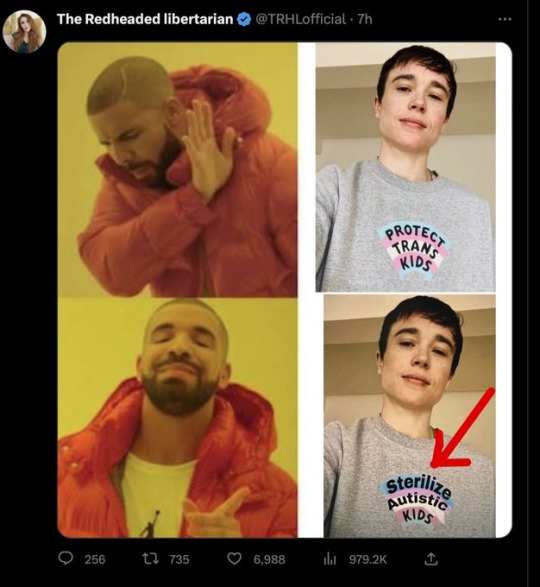
Elon Musk is under fire for 'liking' this highly offensive and disgusting meme. Elon Musk, who is himself on the Autism Spectrum, thought this was funny.
He's also been known to refer to his diagnosis by the Nazi guy's name.
I for one am extremely offended by this. If I wasn't already off of Twitter than I'd definitely be off of there now.
#tw sterilize autistic kids#elon musk#fuck elon musk#autism spectrum disorder#sterilization#filthy disgusting little man#self diagnosed autism#self diagnosed autistic#neurodivergent#actually neurodivergent
145 notes
·
View notes
Text

Blood of the Condor (Yawar Mallku), (1969), film poster. (director: Jorge Sanjinés)
"Ignacio (Marcelino Yanahuaya), the proud chief of a tribe of Quechua natives in remote Andean Bolivia, discovers that his wife cannot bear children. Like the other women of their village, she has been secretly sterilized against her will at an obstetric clinic operated by a purportedly beneficial aid group from the United States, with the covert help of the Bolivian government. Ignacio gathers the men of his tribe to exact revenge and bring justice to his people."
The story, which was based on accounts by indigenous people to Jorge Sanjines, provoked a public outcry which led to a government investigation about the Peace Corps' actions in Bolivia, ending in their expulsion from the country.



Part of an interesting albeit slightly flawed review on IMDB:
"... Molly Geidel, author of, "Peace Corps Fantasies: How Development Shaped the Global Sixties" found documents decades later clearly showing that the Bolivia Peace Corps director and volunteers with the agency, inserted IUDs in indigenous Aymara women at the time, despite not always having medical credentials and not being able to communicate well with the women.
So, it would seem that it wasn't the large-scale premeditated sterilization of a people that this film would have you believe (that is debatable), but none-the-less, an incredibly problematic policy practiced by the U.S. Peace Corps. It's not a long walk from nonconsensual contraception to accusations of population control. But the true story gets more complicated.
Long after this movie was released, a 2002 report by Peruvian Health Minister Fernando Carbone suggested that the president of neighboring Peru, all around asshole Alberto Fujimor, was involved in the forced sterilizations of up to 300,000 Quechua and Aymara women between 1996 and 2000 as part of a population control program called "Voluntary Surgical Contraception".
The United Nations and other international aid agencies supported this campaign, and yes, USAID provided funding and training for it. Whether these Western NGO's and Orgs were told that it was a voluntary family planning program (as the title suggested) or they knew it was a crime against humanity, I can't say.
The point is, the conspiracy theories this film uses to push its political agenda are based on either an eventual truth, or an ongoing truth that we simply don't have the full reportage of. So the movie's anger is prophetic or timely, but regardless, righteous."
Source:


14 notes
·
View notes
Text
Guys... Guess who is OFFICIALLY approved for a tubal ligation?
This girl!!!
#pro choice#sterilization#child free#anti natalism#child free feminism#radical feminists please interact#radical feminism#my body my choice#womens rights
20 notes
·
View notes
Text
The forceful American Catholic liberal Father John A. Ryan, among others, warned that once the sacredness of the individual was weakened, all human rights were placed in jeopardy. Compulsory sterilization of the mentally deficient might well lead to compulsory sterilization of the "socially inadequate", then to "the killing of all sorts of incurables".
"In the Name of Eugenics: Genetics and the Uses of Human Heredity" - Daniel J. Kevles
#book quotes#in the name of eugenics#daniel j kevles#nonfiction#forceful#american#catholic#liberal#father john ryan#john ryan#sacredness#individual rights#human rights#sterilization#mentally deficient#mental deficiency#inadequate#incurable
25 notes
·
View notes
Text

What I think every time I see a post on social media with parents complaining/crying about their choice to have kids and how stressful/expensive/tiring/stressful it is. Like parents complain about their “job” all the time, the fact that a major portion of parenting involves sh*t that sucks isn’t a secret.
102 notes
·
View notes
Text

#autoandrophilia#t4t kink#ftm nsft#queer nsft#ftm bottom#ftm#mlm nsft#trans masc#transgender#trans nsft#trans man#trans masculine#transmasc#forced masc#forced masculinization#force masculinization#force masc#forced masculine#autoandrophile#sterilization#forced sterilization#boy hypno#hysterectomy#hypnosis#ftm t4t
17 notes
·
View notes
Text


youtube
WOKE politicians 'support gay CONVERSION therapy' as confused kids 'fast-tracked to STERILISATION'
Andrew Doyle: On Friday there was a heated debate in the House of Commons about conversion therapy. Emotions ran high and few were more impassioned than the conservative MP Alicia Kearns who berated Alba MP Neil Hanvey for appealing on behalf of the LGB community.
So, here's how that exchange went.
Hanvey: People in the LGB community are often referred to as bigots and transphobes and other slurs just because we have concerns about legislation such of this. And we want to make sure that young LGB people are protected. And trans people. Does she agree with me that that must apply, that rule must apply, to all sides of any debate and not just one side that she favors.
Kearns: ... absolutely right, but there was one digit missing from his LGB: LGBT. We do not divide the LGBT community in this place. You can say that you have concerns about we doing. But by removing the T, you are suggesting that transgender people do not exist. You are suggesting they are lesser than other LGB people. And I will not stand for that, because it was trans people who stood with gay people at Stonewall. It was trans people who fought alongside for LGBT rights. So, when you say LGBT, when you remove the T, you suggest that they are lesser.
Doyle: Now it's clear to me that Alicia Kearns is well intentioned and sincere, and I mean no disrespect when I say that this is a subject about which she clearly knows very little. And that is dangerous, because if she gets her way on this issue, it will set back gay rights by decades.
So, let's address some of the key misconceptions. So, firstly, Kearns claimed that Hanvey was suggesting that transgender people don't exist, and at no point did he make such a claim. Sexual orientation and the belief in gender identity are totally unrelated concepts. Kearns seems to be suggesting that gay people have no right to campaign for their interests unless they simultaneously campaign for trans people. But why? Groups such as Mermaids campaign solely for trans rights. Are they therefore homophobic? Perhaps Alicia Kerns would like to berate them in Parliament. I look forward to seeing that.
Kearns went on to say that it was trans people who stood with the gays at Stonewall. Trans people fought together for LGB rights. Did they? I mean there were some trans people involved in the struggle for gay rights, certainly. But not all that many. The activists who changed history for the better were predominantly lesbians and gay men. At the Stonewall Inn, it was mostly gay men with some lesbians and drag queens who were involved in the riots. And it was likely a lesbian, Stormé DeLarverie, who sparked the whole thing. After the police raided the bar, she was being forcibly arrested and is said to have shouted to the crowd, aren't you going to do something?
Now, some trans activists have since attempted to rewrite history, claiming that a transwoman called Marsha P. Johnson threw the first brick at the Stonewall Inn. The trouble is, Marsha P. Johnson wasn't trans. He was a drag queen. And he wasn't even there when the rioting started.
Now, if Alicia Kearns wants to know about the actual history of Stonewall, not the revisionist fabrications of activists, she could read "Stonewall: The Riots That Sparked the Gay Revolution," by David Carter. Or, she could talk to someone who was actually there, such as the gay rights veteran Fred Sargeant.
Now let's talk about the confusion that's at the heart of this parliamentary debate. What exactly is conversion therapy? A YouGov poll last year revealed that 65% of voters believe that gay conversion therapy ought to be banned, and 62% feel the same about "trans conversion therapy." And this would suggest that most voters do not recognize the difference between the two, and nor do many politicians. Now this photograph was taken in Westminster Hall. A cross-party collective of dozens of MPs with a placard that reads, "I support a trans inclusive ban." The image was posted on Twitter by Laboir MP from Nottingham East, Nadia Whittome.
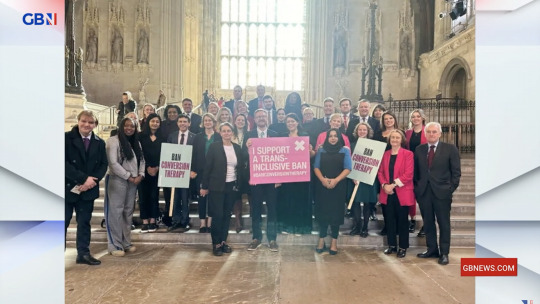
In truth, and without realizing it, the these politicians are supporting a new form of gay conversion therapy, something that most of us thought would be consigned to the history books by this point. When we hear that phrase, "conversion therapy," most of our minds leap to a variety of horrific practices. So, in America, Christian fundamentalists have established programs to address the "problem" of homosexuality, there are camps where young people can "pray the gay away." Which I suppose is at least a step forward from brain surgery, castration and the kind of electric shock treatment favoured by scientific practitioners in the 20th century, or the corrective rape of lesbians to "cure" them of homosexual tendencies that still goes on in some countries.
Such practices are of course already illegal in the UK. So, why the need for a conversion therapy ban? Well, what's happening is there is a conflation of sexual orientation and gender identity and this is why so many are confused. In her book, "Time to Think," Hannah Barnes revealed that between 80 to 90% of adolescents who were referred to the Tavistock pediatric gender clinic were same-sex attracted. We've known for a long time there's a strong correlation between gender nonconformity in youth and being gay in adult life. Members at the Tavistock itself joked that, "soon there would be no gay people left." Whistleblowers revealed that homophobia was endemic. In other words, children who are likely to grow up gay are being "fixed" by medical practitioners to better conform with stereotypical heterosexual paradigms.
Barnes's research shows that the Tavistock clinic -- and this is a quote -- "ignored evidence that 97.5% of children seeking sex changes had autism, depression or other problems that might have explained their unhappiness." They are only 2% of the country's children that suffer from an autistic spectrum disorder, so why is it that 35% of referrals to the Tavistock fit into that category?
in almost all instances, children who are prescribed puberty blockers go on to cross- sex hormones, which in some cases leads to irreversible surgery. We're dealing here, overwhelmingly, with gay and autistic children fast-tracked onto a pathway to sterilization. This is what MPs such as Lloyd Russell-Moyle and Alicia Kearns and Keir Starmer are supporting. Whether they realize it or not.
Now, thankfully, more and more people are waking up to the scale of this problem. So, recently the equalities Minister Kemi Badenoch wrote to the Commons Women and Equality Select Committee about her discussions with former clinicians at the Tavistock. And the conclusion? So-called gender affirmative care amounts to what she described as, "conversion therapy for gay kids." And crucially, she cited a survey of detransitioners -- these are people who have been pressurized into transitioning and they later regret it -- in which 23% of respondents put their determination to transition down to experiences of homophobia.
Badenoch quoted a gender clinic in Germany. They said, "it must be understood that early hormone therapy may interfere with the patient's development as a homosexual. This may not be in the interests of patients who, as a result of hormone therapy, can no longer have the decisive experiences that enable them to establish a homosexual identity."
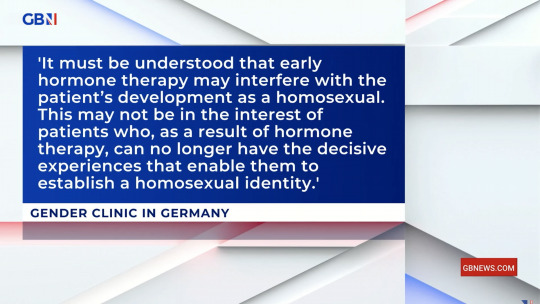
It is profoundly disturbing that Starmer's Labour party is now officially supporting gay conversion therapy in the form of a ban on "trans-inclusive conversion therapy," and that he's gaining cross-party support. Now, a charitable interpretation is that Starmer, Kearns, Russell-Moyle, Whittome, all the other MPs who are supporting this, simply do not understand that they are advancing dangerously anti-gay proposals. They are supporting the new Section 28. And all the while, they think they're doing the precise opposite.
If any of these politicians would like to come on to this show and discuss these issues, I would be delighted to have them. Consider it an open invitation. In the meantime, I'd like to remind Parliament that homosexuality was removed from the World Health Organization's list of psychiatric disorders back in 1993. Being gay is not a medical condition that requires treatment. Unfortunately, activists have been remarkably successful in confusing the issues through semantic ambiguities and the redefinition of terms. And so, although it sounds desperately counterintuitive, the truth is that in order to oppose gay conversion therapy, one must be opposed to a ban on "trans conversion therapy."
#Andrew Doyle#no debate#gay conversion therapy#conversion therapy#woke homophobia#anti gay#homophobia#historical revisionism#Marsha P. Johnson#Stonewall Inn#Stonewall riots#gender ideology#queer theory#intersectional feminism#gender identity ideology#sterilization#autism#trans the gay away#autism spectrum#religion is a mental illness
10 notes
·
View notes
Text
Here is a list of 850+ doctors who are willing to perform tubal sterilizations for patients 18-21+, regardless of martial status or number of children already had.
313 notes
·
View notes
Text
Ever since I was a little creature I wanted to be sterilized
15 notes
·
View notes